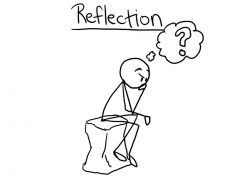 Abraham Lincoln
If given the truth, the people can be depended upon to meet any national crisis...
Abraham Lincoln
If given the truth, the people can be depended upon to meet any national crisis...
 Guildford news...
for Guildford people, brought to you by Guildford reporters - Guildford's own news service
Guildford news...
for Guildford people, brought to you by Guildford reporters - Guildford's own news service
XX Notes: The Long Journey Inward
Published on: 13 Mar, 2021
Updated on: 16 Mar, 2021
Maria Rayner‘s fortnightly, observational column from a woman’s perspective…
Sunday night tantrums, last-minute homework and checking the pencil-case for pens, pencils, rulers and cute, smelly rubbers. (Or is that last one just me?)
For parents, the back-to-school routine is more: email permission slips, lost shoes and oh my God those trousers are really much too short how have you grown so much in just a few weeks :-?.
The media is full of warnings about anxious children returning to school, having forgotten the 3Rs and how to socialise with friends, only glimpsed through iPad screens over the past few months.
 Radio phone-ins are packed with correspondingly anxious parents, mainly keen for children to return to school, but also worried about how their children will catch up on up to a year’s lost schooling. What does post-pandemic life look like?
Radio phone-ins are packed with correspondingly anxious parents, mainly keen for children to return to school, but also worried about how their children will catch up on up to a year’s lost schooling. What does post-pandemic life look like?
Surrey County Council recognises this fear and has advice with links to their wellbeing pages and individual schools are also addressing some of these concerns.
Some are focusing on students’ social interaction before going full steam ahead on educational catch-up, others are providing extra opportunities for outside and physical education, recognising that kids have had few opportunities to leave the house since Christmas.
How about the rest of us? The reopening of schools is 0.5 on the four-step plan. Children are the trailblazers in the return to normality. My increased anxiety levels could be put down to my son’s return to school, but conversations with several friends got me thinking. Are we feeling a similar back-to-school style anxiety or does this unease run deeper? Has our prolonged isolation led to a period of intense reflection?
 Generally, self-reflection is seen as a good thing. Students are encouraged to reflect on their learning. Even my short computer skills course at Brooklands College had reflection as an assessed unit. The Open University has an advice page for students, who are often older and may not have been encouraged to do this previously.
Generally, self-reflection is seen as a good thing. Students are encouraged to reflect on their learning. Even my short computer skills course at Brooklands College had reflection as an assessed unit. The Open University has an advice page for students, who are often older and may not have been encouraged to do this previously.
‘Reflecting helps you to develop your skills and review their effectiveness, rather than just carry on doing things as you have always done them. It is about questioning, in a positive way, what you do and why you do it and then deciding whether there is a better, or more efficient, way of doing it in the future.’
Self-reflection in this positive way is undoubtedly a good thing. As the OU also points out, you wouldn’t make a cake without thinking about how you might do it differently next time, especially if it overflows as badly as my recent banana bread effort. We all do it to a greater or lesser extent.
What if being shut away from our usual habits and routines forced us to drill down too deeply into our lives. In the early days of the pandemic it might have been a good thing to start a regular exercise routine, change the layout of the house or, in my case, pick up my writing. And let’s hope that borough councillor Caroline Reeves’ decision to up sticks and move in order to start a glamping business with her daughter is one of these.
If your work has continued because you’re a key worker, then you will have added stresses to contend with. If work has stemmed from your kitchen table, spare room or new home office under the stairs, then you might have adapted to the frustrations and bonuses by now.
If life has been on hold because of furlough or Covid-induced redundancy, then you will have very real fears about the future.
If your self-reflection has meant you’ve come to terms with problem-drinking, which your inner voice had previously kidded you was “only” social drinking, or being locked up in a toxic relationship has prompted a separation then big life changes are still positive.
But if this protracted insular experience has caused you to question big life decisions that are unwelcome or the changes you want to make might upset people you love then self-reflection becomes tinged with more negative emotions such as regret or frustration, which are harder to live with.
Too much self-reflection can be unhelpful. This is when it becomes introspection. So, you gave up work to raise a family and now you can’t get back on the career ladder: look at your confident happy children. Would they say you made the wrong decision?
You gave up a secure job with a pension to work for the start-up that promised to make you a millionaire within three years but nosedived at the first sign of a recession: what life skills have you gained, resilience, adaptability, consequences of risk-taking?
 Organisational psychologist Tasha Eurich has written extensively on this subject. She discovered 95% of people think they are self-aware, but only 10 to 15% are. If you’re a typical person, sitting at home reflecting on your poor life choices means you’re probably getting it wrong and could be beating yourself up without due cause.
Organisational psychologist Tasha Eurich has written extensively on this subject. She discovered 95% of people think they are self-aware, but only 10 to 15% are. If you’re a typical person, sitting at home reflecting on your poor life choices means you’re probably getting it wrong and could be beating yourself up without due cause.
Her research uncovered that the genuinely self-aware, those whose reflection is genuine, are more like to use the word ‘what’ in a conversation rather than ‘why’. What is a forward-thinking
word, while why focusses on the past. Why looks at the things causing a bad situation. What leads you to think about doing things differently going forward.
Back to my imaginary examples. Stepped off the career ladder? What skills do you have or need to develop to get a fulfilling new job? Lost your secure job? Update your LinkedIn profile with those new skills and connect with people you may not have met if you had stayed in the secure environment.
Whether you are feeling understandable back-to-school anxiety or are questioning your very existence, focus on the positives. I’ll leave you with my enduring image of missed opportunity:
Mr Stevens waving off Mrs Benn in the final scene of Remains of the Day [link to https://www.youtube.com/watch?v=34bCs92ACpk]. The ultimate example of the pain of not being self-aware. Ask what, not why.

See Dragon story: GBC’s Explanation of Major Land Sale Notice Error ‘Borders on Arrogant’ Says Councillor






Recent Articles
- Guide to Telephone Befriending Services for Older People
- Stage Dragon: Sleuth at the Yvonne Arnaud Theatre
- Guildford Lido All Set for the 2024 Season
- Appointment of Permanent Joint Strategic Director of Finance Confirmed
- Police and Crime Commissioner Candidate Interview – Alex Coley
- New Approach to Mental Health Concerns Reported to the Police
- Letter: Bernard Quoroll ‘s Insight Should Be Heard
- Police and Crime Commissioner Candidate Interview – Paul Kennedy
- Staff Union Warns Surrey University of No Confidence Votes
- Invitation to Join Mass Bike Ride on Saturday, April 27


Search in Site
Media Gallery
Dragon Interview: Local Artist Leaves Her Mark At One of England’s Most Historic Buildings
January 21, 2023 / No Comment / Read MoreDragon Interview: Lib Dem Planning Chair: ‘Current Policy Doesn’t Work for Local People’
January 19, 2023 / No Comment / Read MoreA3 Tunnel in Guildford ‘Necessary’ for New Homes, Says Guildford’s MP
January 10, 2023 / No Comment / Read More‘Madness’ for London Road Scheme to Go Ahead Against ‘Huge Opposition’, Says SCC Leader
January 6, 2023 / No Comment / Read MoreCouncillor’s Son Starts Campaign for More Consultation on North Street Plan
December 30, 2022 / No Comment / Read MoreCounty Council Climbs Down Over London Road Works – Further ‘Engagement’ Period Announced
December 14, 2022 / No Comment / Read MoreDragon Interview: GBC Reaction to the Government’s Expected Decision to Relax Housing Targets
December 7, 2022 / No Comment / Read MoreHow Can Our Town Centre Businesses Recover? Watch the Shop Front Debate
May 18, 2020 / No Comment / Read More








Recent Comments